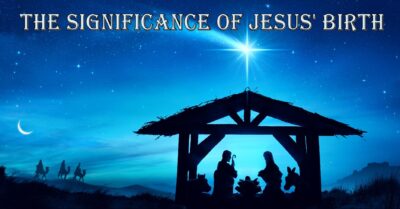(All Scriptures are quoted from the New King James Version of the Holy Bible)
The website (www.wilstar.com/christmas/merry-christmas-meaning/) defines Christmas as a combination of a phrase called “Christ Mass,” a large mass where millions gathered to honor the birth of Jesus Christ during the fourth century and became an annual tradition. Pope Julius I, a bishop of a Catholic Church from Rome, Italy, declared December 25th as the date to hold “Christ Mass” each year to celebrate Jesus’ birth. The Pope then shortened the phrase to Christmas to make a holiday into a cultural mix and make it possible for pagan and all Christian cultures to celebrate it. Since the 19th century, people nationwide have celebrated Christmas. However, Christmas became a federal holiday in America in 1870 signed into law by President Ulysses Grant (www.freedomforum.org/why-is-christmas-federal-holiday/). Why is the birth of Jesus Christ so significant? The significance of Jesus’ birth is God reveals Himself in Jesus’ human form to manifest His glory to His people.
In the beginning was the Word, and the Word was with God, and the Word was God (John 1:1). He was in the beginning with God (John 1:2). “The Word” in these scriptures is a title of Jesus Christ, for He was named “the Word of God” in Revelation 19:13. Being “the Word,” Jesus was with God in the beginning of time and was also God at that time Himself. The Word became flesh and dwelt among us, [the people of God] and we beheld His glory, the glory as of the only begotten of the Father (John 1:14). That scripture says that Jesus, “the Word,” developed into human form and lived among us by the glory of God, the Father of our Lord Jesus Christ. Thereby, we have observed God’s majesty. No one on earth has ever seen God but Jesus. Being the only begotten Son in the bosom of the Father, Jesus is the only One with a close and intimate relationship with God. Thus, Jesus has made God known to us (John 1:18).
Hence, Jesus is the image of the invisible God, the firstborn of all creation (Colossians 1:15). Jesus is also the brightness of God’s glory and the expression of His person (Hebrews 1:3). For those reasons, the prophet Isaiah prophecies that Jesus will be called “Mighty God” and “Everlasting Father” on the night of His birth (Isaiah 9:6). Since the splendor of God dwelt among us in Jesus’ body, the prophet Isaiah prophesies Jesus will be named Immanuel when the Virgin Mary gives birth to Him (Isaiah 7:15). Repeating this prophecy to Joseph, the husband-to-be of the Virgin Mary, in the gospel of Matthew, an angel of the Lord translated Immanuel as “God with us (Matthew 1:23).
While Jesus was with His disciples, Jesus told them that He is in the Father, and the Father is in Him. If anyone knows and sees Jesus, they know and see God. Since Jesus made that revelation to the disciples in His presence, they have known and seen God, His Father (John 8:19, 12:45, 14:7, 9, and 11). Likewise, Jesus has made God known to us, the people of God. Because we know Jesus, we know that God dwells with us. Since Jesus the Immanuel made his dwelling among us, we know that every Spirit who confesses that Jesus has come into the flesh is of God (1 John 4:3). He has given us His Spirit to know we abide in Him, and He in us (1 John 4:13). Hence, whoever confesses that Jesus is the Son of God, God lives in them, and they are in Him (1 John 4:15).
The bottom line is Pope Julius I created the Christmas holiday so people of every religious cult, sect, and church denomination, even the heathen, worldwide can give God honor and praise through the Incarnate Jesus Christ, born as a Holy Infant, who revealed God’s nature. And being filled with the spirit of God’s glory manifested in Jesus’ incarnation is the significance of Jesus’ birth—Kenneth Sullivan.


